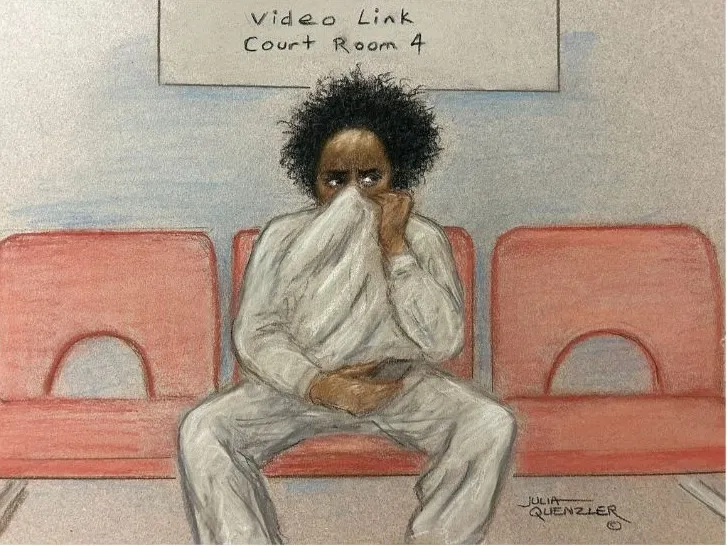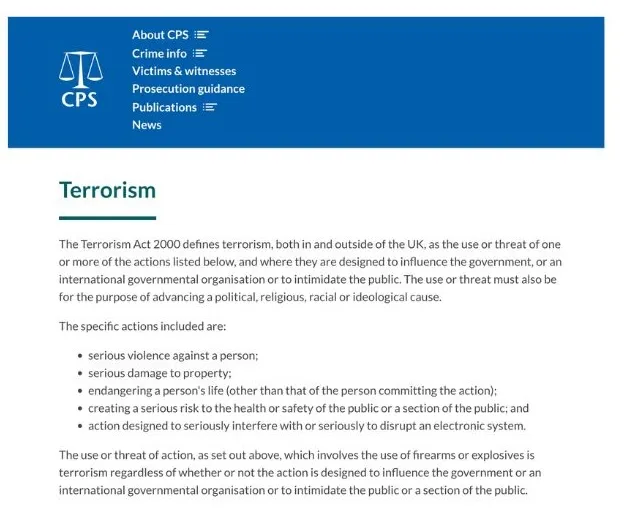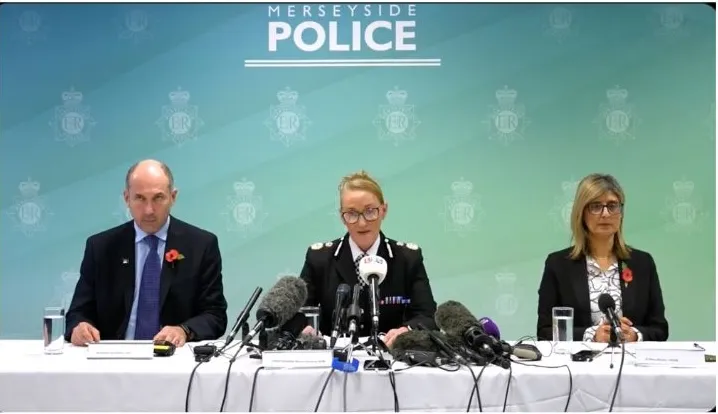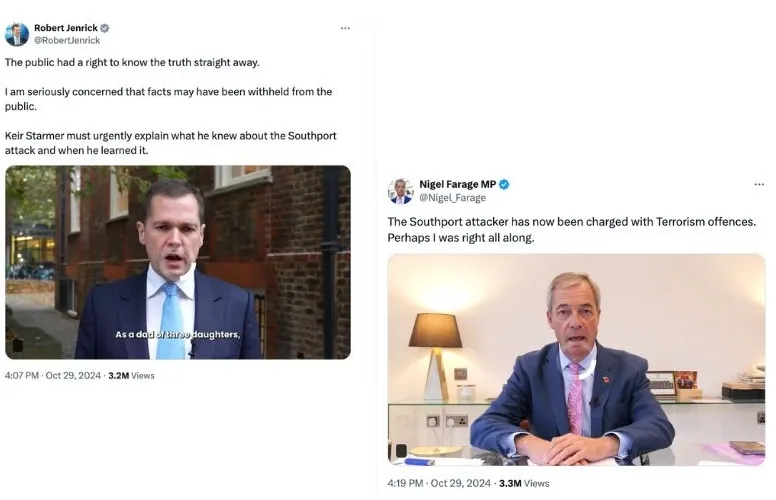By: Emmi Kivi
November 1 2024
 A court drawing of the suspect, Axel Rudakubana, appearing via video link at Westminster Magistrates' Court (Source: Courtesy of Julia Quenzler/Handout via Reuters)
A court drawing of the suspect, Axel Rudakubana, appearing via video link at Westminster Magistrates' Court (Source: Courtesy of Julia Quenzler/Handout via Reuters)
New charges levied against Southport stabbing suspect Axel Rudakubana on October 29 reignited a wave of misinformation and Islamophobic rhetoric as online users passed judgment on the ongoing criminal investigation.
After Rudakubana was charged with production of the poison ricin and possession of a PDF file titled "Military Studies in the Jihad Against the Tyrants: The Al-Qaeda Training Manual," the wave of accusations and erroneous claims echoed the narratives of a "government cover-up" that surfaced months ago when the stabbing incident initially occurred and spurred riots across the U.K.
Some social media users, including Britain First co-leader Paul Golding, shared posts describing Rudakubana's religious identity despite no such information having been confirmed by police. They also made unsubstantiated assumptions about his guilt despite no verdict having yet been delivered.
Meanwhile, prominent far-right figure David Atherton posted on X questioning the timeline of events and the suspect's alleged motivation, as well as echoing allegations of a cover-up.
As the legal proceedings continue, Logically Facts examines what we know so far about the new charges against the Southport suspect and unpacks some of the misconceptions circulating online.
On October 29, the Crown Prosecution Service (CPS) announced two further charges against Axel Rudakubana, from Banks in Lancashire. The charges relate to the evidence obtained by Merseyside Police during searches of the suspect's home address.
The CPS stated that issuing the charges took so long due to the "lengthy and complex investigation" that followed the stabbing incident on July 29, according to the BBC.
The prosecutor, Deanna Heer KC, made an application for the new charges to be linked to other charges Rudakubana is facing over the stabbing in Southport. Rudakubana already faces three charges of murder, ten charges of attempted murder, and one charge of possession of a knife, according to the CPS statement.
On October 30, the suspect appeared at a Westminster Magistrates' Court hearing via video link and was remanded in custody to appear at a plea hearing at Liverpool Crown Court on November 13.
A provisional trial date is set for January 2025. Therefore, Rudakubana has only been charged with, not convicted of, the abovementioned offenses, and U.K. authorities have not found him to be a "terrorist" in any capacity.
Merseyside Police stated that, "At this time, Counter Terrorism Policing has not declared the attack on Monday 29 July a terrorist incident."
For an act to be treated as terrorism by U.K. authorities, it must meet a series of legal tests inscribed in the Terrorism Act 2000. According to the Act's section one, terrorism is defined as the use or threat of one or more of the following actions:
• Serious violence against a person;
• Serious damage to property;
• Endangering a person's life (other than that of the person committing the action);
• Creating a serious risk to the health or safety of the public or a section of the public; and
• Action designed to seriously interfere with or seriously to disrupt an electronic system.
According to the Terrorism Act, the act must be "designed to influence the government, or an international governmental organization or to intimidate the public," and the use or threat "must also be for the purpose of advancing a political, religious, racial or ideological cause."

The definition of terrorism under the U.K. Terrorism Act 2000. (Source: the Crown Prosecution Service)
"The matter for which Axel Rudakubana has been charged with under the Terrorism Act does not require motive to be established. For a matter to be declared a terrorist incident, motivation would need to be established," Merseyside Police Chief Constable Serena Kennedy clarified in the police statement.
Kennedy confirmed that Counter Terrorism Policing North West had offered support to the investigation on the day of the attack, although any alleged motivation remained unclear. The event was not treated as terror-related at the time.
The police can ask counter-terror officers to assist in major incidents and have access to more resources to proceed with the investigation. Their involvement does not automatically mean that the police are investigating a terrorist incident.
Moreover, as stated on the Crown Prosecution Service (CPS) website, a person does not have to commit an act that could be considered a terrorist attack to be charged or convicted of a terrorist offense. Planning, assisting, and collecting information on how to commit terrorist attacks are criminal offenses under English law.
Rudakubana was charged with the latter under section 58, "Collection of information," for possessing a PDF file titled "Military Studies in the Jihad Against the Tyrants: The Al-Qaeda Training Manual" of a kind likely to be useful to a person committing or preparing an act of terrorism. The suspect is accused of possessing the manual between August 29, 2021, and July 30, 2024.
Rudakubana was also charged with the production of the biological toxin ricin under the Biological Weapons Act 1974 section one, "Restriction on development etc. of certain biological agents and toxins and of biological weapons."
During a news briefing, Merseyside Police Chief Constable Serena Kennedy clarified that the production of ricin was not considered a terror offense, and neither was ricin found at the scene of the Southport stabbing.

Professor Tim Atkins, senior scientific adviser for the Defence Science and Technology Laboratory; Merseyside Police Chief Constable Serena Kennedy; and Dr. Renu Bindra, a senior medical advisor at the U.K. Health Security Agency, at a police press conference on October 29 (Source: X)
Ricin is a poison found naturally in castor beans. When the beans are processed, the leftover material waste can be used to make ricin, according to the Centers for Disease Control and Prevention (CDC) website.
Ricin can be in the form of a powder, a mist, or a pellet; it can be dissolved in water or weak acid. The effects of ricin poisoning include respiratory distress, fever, diarrhea, or vomiting, depending on whether ricin was inhaled, ingested, or injected. The police have not disclosed the form the ricin was found at Rudakubana's home in early August.
Senior medical advisor at the U.K. Health Security Agency, Dr Renu Bindra, stated that, "there was no evidence any victims, responders or members of the public were exposed to ricin either as part of the incident or afterwards." The health authorities' risk assessment concluded that the risk to the wider public was low.
To charge someone under the Biological Weapons Act, the Crown Prosecution Service (CPS) has to obtain consent from the government's law officers, such as the Attorney General. The BBC reported that consent was requested in this case in recent weeks and granted "within days."
Prime Minister Sir Keir Starmer and Home Secretary Yvette Cooper have come under growing pressure, including from members of opposition parties, to reveal what they knew about the suspect.
For example, after the new charges were announced, Conservative Robert Jenrick posted on X, "The public had a right to know the truth straight away. I am seriously concerned that facts may have been withheld from the public. Keir Starmer must urgently explain what he knew about the Southport attack and when he learned it."
 Robert Jenrick's X post, left, and Nigel Farage, right. (Source: X/Modified by Logically Facts)
Robert Jenrick's X post, left, and Nigel Farage, right. (Source: X/Modified by Logically Facts)The narrative was also amplified by the Reform U.K. Leader Nigel Farage, who said he may have been "right all along." Farage was a key figure in magnifying speculation of concealment of information back in July when the stabbing took place in Southport. Combined, Jenrick's and Farage's X posts have been viewed more than six million times.
The Prime Minister's Office was swift to deny claims of a cover-up or withholding information from the public. A Downing Street spokesperson denied claims the government was involved in the timing of the charging announcement and stated it is "a matter for the Crown Prosecution Service" to decide.
A former counter-terror officer told the Telegraph that the politicians should not disclose all information available to them. "It's a live, ongoing police investigation," they said. "Charges have been laid but there might be further charges. It is not for politicians to interfere with justice."
Logically Facts has previously covered the legal risks of sharing misinformation about the Southport stabbing. The Contempt of Court Act 1981 sets out provisions that prevent publishing information that could influence a jury's decision in an upcoming trial.
"The Contempt of Court Act of 1981 represents the system provided in this jurisdiction to ensure that the right to a fair trial — as enshrined in Article 6 of the European Convention on Human Rights — is protected. Anybody — mainstream publications, celebrities, bloggers, ordinary social media users — can be prosecuted for publishing something which breaches the 1981 Act," Charlie Moloney, a media law consultant and trainer, clarified to Logically Facts.
However, lack of information may lead to a vacuum and a spill of misinformation and harmful narratives to spread online — as occurred now and after the Southport stabbing in July. The Telegraph reported that police forces were instructed to ensure backup provisions this week to prepare for potential unrest after the announcement of the new charges.
"It is important to state that the Southport case is a fiendishly difficult matter to report on while following the conventional rules of contempt of court," Moloney told Logically Facts. "There is already a plethora of information about the alleged offenses in the public domain."
"Also, while it is clear in law that publishing anything which vilifies the defendant and exposes them to public obloquy is contempt of court, countless high-profile persons have consistently spoken about this defendant in a manner which would be likely to prejudice people against him," Moloney further told Logically Facts.
"We would strongly advise caution against anyone speculating as to motivation in this case. The criminal proceedings against Axel Rudakubana are live and he has a right to a fair trial," Chief Constable Kennedy stated in the police press release.